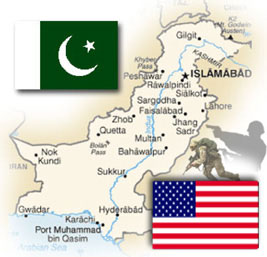JIM.LOBE

WASHINGTON (IPS/GIN) – As the Pentagon scrambled to satisfy Pakistani demands for a full accounting of a lethal air attack on two border posts, official Washington expressed hope that Islamabad’s retaliation will be limited in both time and scope.
So far, Pakistan closed two border crossings used by the U.S. and NATO convoys to supply their troops in Afghanistan for the first time this year. It has not indicated when the crossings, over which about 40 percent of total supplies for the International Security Assistance Force (ISAF) travel, may be reopened, although the interior minister, Rehman Malik, suggested Nov. 26 that the blockade may be permanent.
It also ordered Washington to vacate the Shamsi Air Base in Baluchistan within 15 days. The base has long been used by the Central Intelligence Agency to launch and maintain armed drone aircraft deployed against suspected Taliban forces on both sides of the border.
U.S. officials expressed considerable concern that Pakistan may also decide to boycott a critical international meeting Dec. 5 in Bonn, Germany, on the future of Afghanistan as ISAF prepares to withdraw its forces by 2014. The decision on whether to attend is said to be under review by the Pakistani authorities.
They are also fearful that Islamabad may revoke over-flight rights by U.S. fighter and bomber aircraft on missions to Afghanistan from the Persian Gulf region and surrounding seas.
“If they were to shut that down, then the rupture would be pretty bad,” said Shuja Nawaz, the director of the South Asia Center at the Atlantic Council here.
He said the Pakistani government and the upper echelons of the military were under “strong pressure” from both opposition parties and the army’s lower ranks to retaliate for the attack in which at least 24 soldiers killed by fire from NATO aircraft at the two border stations Nov. 26.
Precisely how and why the attacks took place remains unclear. Unnamed Afghan and ISAF officials have told reporters that U.S. commandos and Afghan forces that were conducting patrols near the border posts came under fire from the Pakistani bases.
According to that account, air strikes were then called in against the two bases.
Pakistani officials, however, have strongly denied those accounts, claiming that the dead and wounded were victims of unprovoked aggression and that the area around the border posts had recently been cleared of suspected Taliban militants.
According to Islamabad, the aerial attacks continued for almost two hours despite pleas by Pakistani officers to their Afghan and NATO counterparts to stop.
For its part, NATO has called the incident “tragic and unintended” and has promised a full investigation. And, in a rare joint statement, Secretary of State Hillary Clinton and Pentagon chief Leon Panetta offered their condolences to the families of the victims and re-affirmed the “importance of the U.S.-Pakistani partnership.”
Whatever actually took place, however, the attack appears to have brought relations between Washington and Islamabad–already badly battered by a series of incidents earlier this year–to a new low.
Relations were already headed steeply downwards after the detention of a CIA contract officer, for whom Washington claimed diplomatic immunity, for killing two men in Lahore who may have been trailing him for the Pakistan military’s main intelligence agency, the Inter-Services Intelligence (ISI).
The May 2 killing by U.S. Navy SEALs of Al-Qaeda chief Osama bin Laden in a raid on his compound in the city of Abbottabad, home of Pakistan’s premier military academy, added fuel to the flames, particularly because no Pakistani officials were notified in advance for security reasons.
More recently, top Pakistani officers were deeply offended when the outgoing chairman of the Joint Chiefs of Staff, Adm. Mike Mullen, publicly charged in October that the Haqqani group, a particularly lethal faction of the Afghan Taliban that, among other actions, is believed to have carried out an attack on the U.S. embassy in Kabul, acted as a “veritable arm” of the ISI.
Senior U.S. officials, including Sec. Clinton and Mr. Panetta, subsequently tried to soften the message. But Adm. Mullen’s remarks helped confirm in the minds of many politicians here that Islamabad was playing a “double game” with the U.S. over Afghanistan, despite Washington’s provision of nearly $20 billion in mostly military aid to Pakistan over the past decade in return for its help in fighting the Taliban and Al-Qaeda.
Indeed, calls by lawmakers, including some Republican presidential candidates, to cut off or drastically reduce aid to Pakistan have increased markedly this fall. At the same time, some Democrats have cited Pakistan’s alleged perfidy as another reason to accelerate the planned withdrawal by 2014 of Washington’s nearly 100,000 troops in Afghanistan.
Conversely, the pressure on Pakistan’s government to end its cooperation altogether with the U.S.–however doubled-edged–has also grown steadily over the past year.
“The anger inside the Pakistan military is palpable,” according to Mr. Nawaz. “And this has now become a political stick with which the opposition parties are beating the government. Both (former Prime Minister) Nawaz Sharif and Imran Khan are saying that Pakistan should stop fighting “America’s war.’ ”
Both Mr. Sharif, the head of the Pakistan Muslim League-N, and Mr. Khan, a former cricket star whose nationalistic and anti-U.S. stance has bolstered his political prospects, hope to replace President Asif Ali Zardari.
President Zardari just suffered a major blow when one of his closest advisers, the strongly pro-U.S. ambassador in Washington, Husain Haqqani, was forced to recently resign, apparently under pressure from the military.
The fundamental problem, according to many experts, is a complete lack of trust between the U.S. and Pakistan, especially Pakistan’s military.












